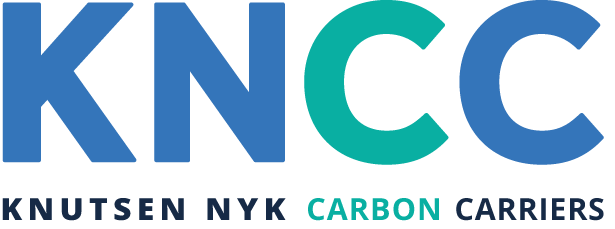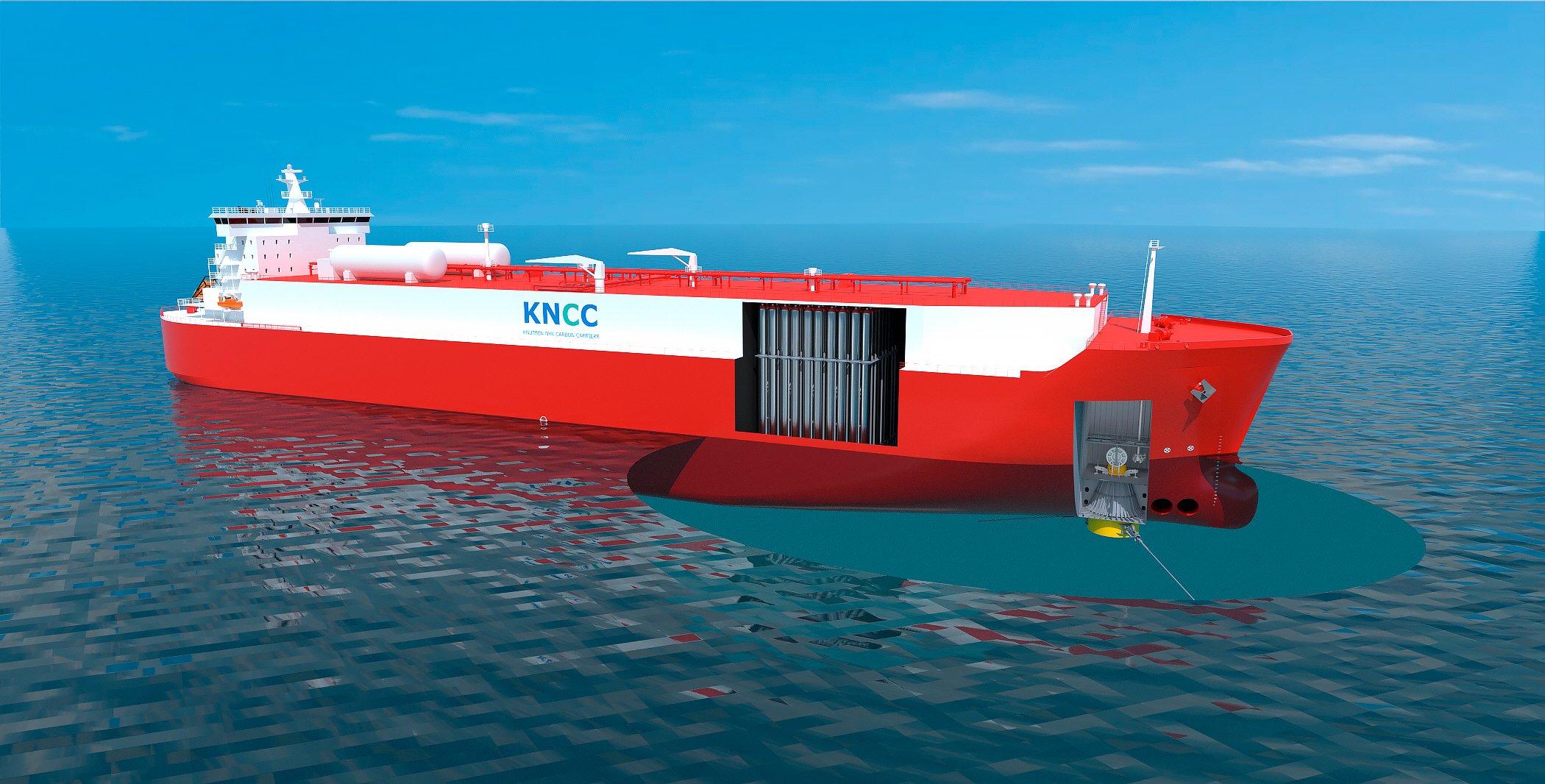Knutsen NYK Carbon Carriers AS (KNCC), a joint venture between Japan’s NYK Line and the Knutsen Group of Norway, has signed a joint research agreement with COSCO Shipping Heavy Industry (CHI) to prepare the market and develop the design of liquefied CO2 (LCO2) carriers for carbon capture, utilization, and storage (CCUS) projects.
(Text by Hiro Yamamoto)
Photo courtesy= Knutsen NYK Carbon Carriers (KNCC), NYK

This collaboration is noteworthy for two main reasons. First, the Knutsen Group, based in Norway, is focused on CCUS projects in the North Sea. While CCUS activities are also gaining momentum in Asia, the direct injection offshore (DIO) method in the North Sea warrants particular attention. Second, the partnership with a Chinese shipyard is significant, especially considering that some Japanese shipyards have also shown interest in constructing LCO2 carriers. The choice of a Chinese shipyard could influence future market trends in LCO2 transportation.
LCO2 carriers are vessels designed to transport liquefied carbon dioxide. As the world pushes towards decarbonization, the development of large, specialized vessels equipped with cargo tank systems capable of transporting and storing liquefied CO2 at ambient temperatures is advancing. The LCO2 carrier that will be the subject of the KNCC and CHI’s joint research is based on KNCC’s proprietary LCO2-Elevated Pressure (LCO2-EP) technology.
The LCO2-EP technology allows liquefied CO2 to be injected into cylindrical tanks on the vessel at ambient temperatures, eliminating the need to cool the CO2 to sub-zero temperatures, thereby simplifying handling and reducing overall energy consumption in the CCUS process. The basic design of the vessel, including the cargo tanks utilizing the LCO2-EP technology, received Approval in Principle (AiP) in 2022, and in 2023, KNCC obtained more detailed design approval (GASA) from DNV, the Norwegian classification society.

The vessel concept under study focuses on direct injection offshore (DIO) ships, which are being considered for many CCUS projects, particularly in the North Sea region. DIO is expected to reduce the time and cost required to establish and operate the CCUS value chain, compared to constructing dedicated terminals or export infrastructure on land or floating platforms.
〆Oliver Hagen-Smith, CEO of KNCC said, “ KNCC is pleased working together with CHI, and believes the collaboration together will contribute to the realization of CCUS projects. KNCC’s LCO2-EP technology is the best match with direct injection offshore operation as it requires less energy and complexity onboard the vessel compared to other cryogenic modes servicing injection of CO2 to permanent storage sites offshore. The operational management is simplified compared to cryogenic modes as the LCO2 is at ambient temperature and relatively higher pressures removing the need for heating offshore prior to injection. Our owners have long relations and first-class expertise for offshore operation through KNCC’s sister company Knutsen NYK Offshore Tankers (“KNOT”) which will contribute to KNCC’s offshore operations.”

〆Shi Wei, the executive in charge of CHI’s offshore business believes that the collaboration with KNCC will create significant potential opportunities for CO2 emission reduction-related projects within the shipbuilding and offshore industries. The LCO2 direct injection vessel, which is based on KNCC’s LCO2-EP technology, represents a unique and highly appealing design and concept from the perspective of shipbuilders. We are excited about the prospect of working together with KNCC on this innovative project.
〆About COSCO Shipping Heavy Industry Co., Ltd.
COSCO Shipping Heavy Industry Co., Ltd. (“CHI”), the equipment manufacturing industrial cluster of China COSCO SHIPPING Corporation Limited, is a large heavy industry enterprise for ship & offshore newbuilding/repair/conversion, and marine supporting service.
With a global customer service network, CHI set up commercial headquarters in Shanghai and representative offices in Hong Kong, USA, Singapore Greece etc. Our clients are around 100 countries in the world. CHI is a well-known offshore oil service provider and the preferred business partner of the world’s leading shipping companies.
〆About Knutsen NYK Carbon Carriers AS
KNCC is a joint venture established between NYKLine and Knutsen Group, for the technology and commercial development of LCO2 marine transportation and storage. KNCC aims to own/manage/operate LCO2 carriers to contribute to the realization of CCS projects globally.
KNCC was established in 2022 between NYKLine and Knutsen Group, each holding 50% stake.
■The Difference Between CCS and CCUS**
What is CCS?
CCS stands for “Carbon dioxide Capture and Storage.” This technology involves capturing and separating CO2 (carbon dioxide) from exhaust gases emitted by facilities such as thermal power plants, steel mills, cement factories, waste incineration plants, and oil refineries, and then injecting and storing it in stable underground formations (reservoirs).
Thermal power generation, which uses fossil fuels like coal and oil, is a major source of CO2 emissions. Similarly, steel mills, cement factories, waste incineration plants, and oil refineries are also significant emitters of CO2.
To achieve carbon neutrality, it is essential to implement measures that reduce CO2 emissions from these types of facilities. CCS has gained global attention as a technology that captures CO2 that would otherwise be released into the atmosphere and stores it deep underground, thereby reducing the overall CO2 emissions.
What is CCUS?
CCUS stands for “Carbon Dioxide Capture, Utilization and Storage.” The key difference from CCS is the addition of “Utilization.”
Unlike CCS, which focuses on storing the captured CO2 in stable underground formations, CCUS emphasizes the beneficial utilization of CO2 as a resource.
For example, CO2 captured during oil extraction can be reinjected to enhance oil recovery, or CO2 from industrial processes can be used in the production of dry ice or as a gas in carbonated beverages.
〆クヌッツェンNYKカーボンキャリアーズ(KNCC)は中国造船所と液化CO2(LCO2)輸送船を共同研究する。
日本郵船とクヌッツェングループ(Knutsen group)の合弁会社である「Knutsen NYK Carbon Carriers AS」(KNCC)と、中遠海運重工(COSCO Shipping Heavy Industry 、CHI)は、CCUS(Carbon dioxide Capture, Utilization and Storage)プロジェクトの市場準備と液化CO2(LCO2)輸送船を設計開発するための共同研究協定を締結した。
今回の両者の技術締結は以下の2点で注目すべきだろう。第1点目はKnutsen groupはノルウェーを拠点としており、北海水域でのCCUS事業を念頭に置いている点にある。アジアでもCCUS事業は活発化しているが、北海水域での直接注入オフショア(DIO)は注目すべき点だ。もう1点は技術開発の提携先が中国造船所という点にある。日本の造船所もLCO2輸送船への建造に意欲を見せる造船所もあり、この点、中国造船所を提携先としたことは今後のLCO2輸送の市場動向にどのように影響するか注目したい。
液化CO2輸送船とは、液化した二酸化炭素を輸送する船舶のこと。 脱炭素の流れの中、 回収したCO2を大量輸送するため、常温で液化CO2の輸送や貯留可能な貨物タンクシステムを搭載する大型専用船の開発が進んでいる。
KNCCとCHIの共同研究の対象となるLCO2キャリアは、KNCCの独自技術であるLCO2-エレベーテッドプレッシャー(LCO2-EP)技術に基づいている。
LCO2―EPは、液化CO2を常温で船上のシリンダータンクに注入し輸送する技術になる。液化CO2を氷点下に冷やす必要がないため取り扱いが容易で、CCUS全体のエネルギー消費量削減も期待される。
LCO2―EP技術を利用したカーゴタンクを含む船体設計については、2022年に基本設計承認(AiP)を取得済み。23年にはノルウェー船級協会DNVから詳細な設計内容に対する承認(GASA)も取得した。
この研究の対象となる船舶コンセプトは、特に北海地域で多くのCCUSプロジェクトが検討している直接注入オフショア(DIO)船に焦点を当てている。DIOは、陸上や浮体式の専用ターミナルや輸出インフラを構築するのに比べて、CCUSバリューチェーンの確立と運用にかかる時間とコストを削減が期待できる。
■KNCCのCEOであるオリバー・ヘイゲン・スミス氏は、次のようにコメントした。「KNCCはCHIとの協力を喜んでおり、この協力がCCUSプロジェクトの実現に貢献することを確信しています。KNCCのLCO2-EP技術は、他のCO2注入にサービスを提供するための極低温モードと比較して、船舶上で必要とされるエネルギーと複雑さが少なく、直接注入オフショア操作に最適です。LCO2は環境温度および比較的高い圧力で維持されているため、注入前にオフショアでの加熱が不要となり、運用管理が簡素化されています。当社の所有者は、KNCCの姉妹会社であるKnutsen NYK Offshore Tankers(KNOT)を通じて、オフショア操作に関する長年の関係と一流の専門知識を持っており、KNCCのオフショア操作に貢献するでしょう」
■CHIのオフショアビジネスを担当する幹部であるShi Wei氏は次のように述べた。
「KNCCとの協力は、造船およびオフショア産業におけるCO2排出削減関連プロジェクトにおいて、重要な可能性を秘めた機会を創出すると信じています。KNCCのLCO2-EP技術に基づくLCO2直接注入船は、造船所の観点からユニークで非常に魅力的な設計とコンセプトを持っています。私たちはこの革新的なプロジェクトでKNCCと共に取り組むことを非常に楽しみにしています」
■COSCO Shipping Heavy Industry について
COSCO Shipping Heavy Industry Co., Ltd.(「CHI」)は、中国COSCO SHIPPING Corporation Limitedの設備製造産業クラスターであり、船舶およびオフショア新造/修理/改造、海洋支援サービスのための大規模な重工業企業である。
グローバルな顧客サービスネットワークを持つCHIは、上海に商業本部を設置し、香港、アメリカ、シンガポール、ギリシャなどに代表事務所を設けています。当社のクライアントは世界中の約100カ国に広がっています。CHIは、よく知られたオフショア石油サービスプロバイダーであり、世界の主要な船会社の優先ビジネスパートナーです。
■Knutsen NYK Carbon Carriers ASについて
KNCCは、日本郵船とクヌッツェングループがそれぞれ50%の株式を保有する形で、2022年に設立した。KNCCは、LCO2の海上輸送および貯蔵の技術と商業開発のために日本郵船とクヌッツェングループが設立した合弁会社である。KNCCは、CCSプロジェクトの実現に貢献するために、LCO2キャリアの所有/管理/運用を目指している。
■「CCS」と「CCUS」の違いについて。
〆CCSとは
CCSは「Carbon dioxide Capture and Storage」の頭文字を略した呼称である。具体的には、火力発電所、製鉄所、セメント工場、ごみ処理施設、製油所などで排出される排気ガスからCO2(二酸化炭素)を分離・回収して、地下の安定した層(貯留層)に圧入・貯留する技術をさす。
石油や石炭などの化石燃料で発電する火力発電では、大量のCO2が排出される。製鉄所、セメント工場、ごみ処理施設、製油所もCO2の排出量が多い施設である。
カーボンニュートラルを実現するためは、このような施設のCO2排出量を抑える施策が欠かせない。CCSは放出されるはずだったCO2を地中深くに圧入し、大気中へのCO2放出量を削減する技術として、世界的に注目を集めている。
〆CCUSとは
CCUSは「Carbon dioxide Capture, Utilization and Storage」の略称である。CCSとの違いは、「有効利用(Utilization)」が加えられた点にある。
CCUSは、排気ガスから分離して回収したCO2を安定した地層に貯留するのではなく、資源として有効利用する点が特徴となる。
CO2の有効利用方法として、例えば、石油の採掘時に分離・回収したCO2を注入して原油の採掘量の拡大を図ったり、工場のCO2を回収してドライアイスや炭酸飲料のガスとして利用したりなどが挙げられる。
